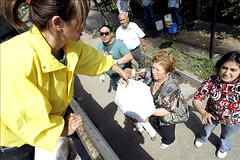
Earthquake in Haiti/ Credit: Matthew Marek, American Red Cross
The devastating earthquake in Haiti has dominated headlines this week, and now we are learning where aid is going and how people are giving. The spread of information and opportunities to contribute to the cause online are more advanced than during any previous crisis – to date, over $5 million dollars has been raised from text message donation programs alone.
Scott Jagow at Marketplace explains how text donations work and why they may be turning “slacktivists” into activists.
Since the money is being billed to customers and collected later, the phone companies have to advance it to the Red Cross and the other organizations…. It also allows people to act immediately as the crisis is unfolding (when they are the most emotionally moved by it as well). The trick will be getting the money in place as quickly as the technology is allowing it to be donated, and of course, as with any natural disaster, properly accounting for it and spending it effectively.
Those text donations may take a little while to meet their destination — up to 90 days — as GigaOm reported, but surely the need will still be there. Social giving site MGive is even mapping where those text donations have come from.
Once the donation is made, where does it go? Doesn’t common sense dictate that Haiti would need goods and services before or in tandem with financial donations? GlobalPost says no – supplies and drugs clog up a system that’s trying to get sorted. After the Asian tsunami in 2004, there was a “mountain of materials that confounded the efforts of the pros, and made it more difficult to deliver essential supplies on the earthquake-ravaged roads.”
Under no circumstances should you mail care packages, toys, food or clothes. Don’t even think about sending drugs. The response to prior disasters shows that regardless of your intentions, you will only be making matters worse.
For a list of where to donate and how, PBS NewsHour has compiled a page of organizations sending relief funds directly to Haiti, including Wyclef Jean’s aid organization Yele, the American Red Cross, and Partners in Health.
In addition to donation resources, there are emerging ways of finding people and information coming out of Haiti.
The Miami Herald and WLRN are following Facebook messages from people in Haiti and Facebook is trying to unclog servers so people can find each other via groups.
A map at http://haiti.ushahidi.com/ plots incidents in Haiti as they occur and reports from workers and citizens.
NPR’s Twitter list aggregates updates from people in Haiti and organizations working in the region.

